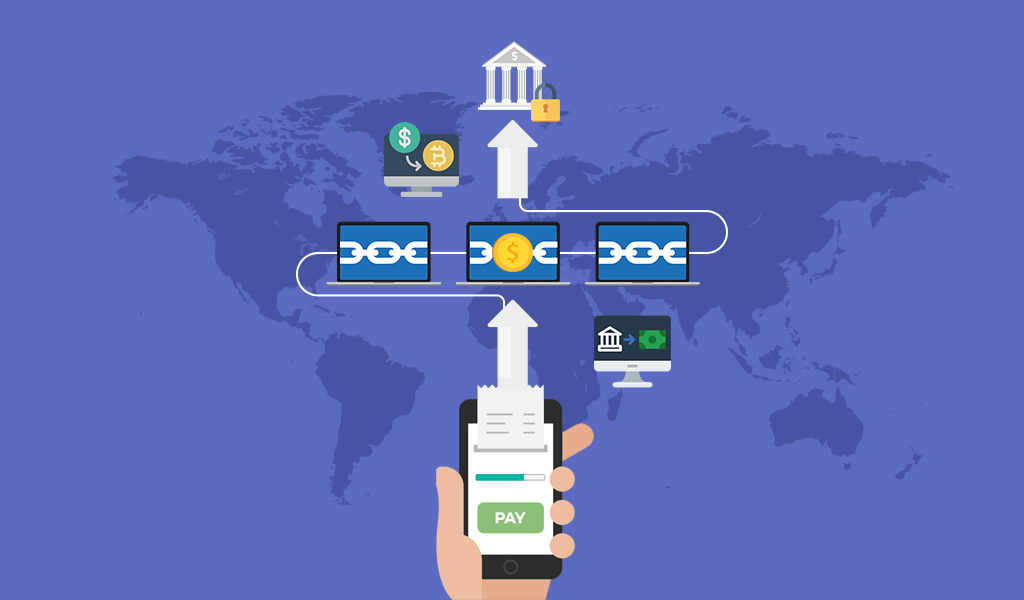The Blockchain technology was introduced to the world around a decade ago, and by now it has securely occupied its place in the sun. But why is it so popular? Well, the answer is very simple — the Blockchain technology allows information to be distributed, but not copied. In this way, Blockchain can’t be controlled by a single entity, and its security is considered to be absolute.
Mostly, Blockchain is used to underpin cryptocurrencies, and their popularity is gaining momentum. Here are several world-famous companies which already accept cryptocurrency:
- CheapAir. This online travel agency allows using Bitcoins, Litecoins, and Dash. That’s a pretty wide selection!
- Microsoft. Here you can use Bitcoins to add some funds to your account. This money can be used for purchasing apps, movies, and games.
- Dish. This U.S. television provider allows paying bills with Bitcoins. The website even offers detailed instructions on how to do this.
All the above-mentioned examples are Fintech products, but we have several more illustrations of how Blockchain changes and integrates into financial components of other products. Here they are:
- Etsy. This platform doesn’t have an automated system for accepting Bitcoins yet, but it is still possible to use them to make payments. The only difference is that a seller will have to contact a customer, and that’s it.
- OKcupid. This dating website is free to use, but members of advanced accounts have a possibility to pay their fees with Bitcoins.
Fintech Before Blockchain
Financial technology, or Fintech, can be defined as the usage of technology in order to deliver financial services or products to clients. For instance, thanks to Fintech, you don’t have to stand in a line to make a deposit. Other examples of Fintech spheres are accounting and individual investment. And, obviously, that’s not the end. To give you a better understanding of what Fintech is, we have prepared a list of its advantages. Take a closer look:
- More convenient payments. Fintech products are delivered online, so it is not essential to go, for instance, to the bank. Everything can be done in a few clicks.
- Robo-advisors. Robo-advisors are a great thing to reduce the company’s expenses, as there is no need to hire extra support agents. Apart from this, unlike people, robo-advisors don’t have to sleep — they can give recommendations to clients 24 hours a day, 7 days a week.
- Improved customer relationship management. Actually, this point is a consequence of the previous one. Customer relationship management, or CRM, software for financial advisors is among the most established Fintech And thanks to improved support service, customers are more satisfied. As a result, they will stay loyal to the company, which is especially important for small businesses and startups.
- More stable and secure funding for small businesses. Innovative finance solutions can be really useful for small companies’ development. For instance, a company can evaluate online transactions in order to identify different commercial opportunities. In this way, small businesses can avoid certain risks and develop steadily.
Applications of Blockchain in Finance
Blockchain is a great tool to improve Fintech. To prove this, we have prepared for you a shortlist of several detailed examples (monetizing and not currency-related) of how Blockchain is applied in finance.

- Simplifying cross-border payments. Some time ago Western Union used to be a big name in the sphere of cross-border payments. However, nowadays Blockchain is taking the wheel since it simplifies and speeds up such payments! The thing is that transferring money via local banks or Western Union requires a lot of middlemen, while the Blockchain technology is self-contained — it cuts out many of them. Moreover, Blockchain technology makes cross-border payments more affordable — it can reduce the cost to 2-3% of the initial total amount.
- Smart Contracts. Smart Contracts are among the most interesting and promising applications of Blockchain solutions, as they allow executing transactions and agreements automatically. Thanks to Blockchain, Smart Contracts are more secure than traditional contract law, and more affordable, as middlemen don’t participate in the contracting.
- Trade finance. The trade finance business usually means the participation of multiple trading partners, and, therefore, loads of paperwork. However, Blockchain can help — it can be used to digitize sales and legal contracts, monitor the location of goods, and so on. Thanks to Blockchain, it is possible to link importers, exporters, banks, insurance companies, transport operators, and government agencies. All the existing processes will simply become more transparent, secure, and affordable.
Security Topic
We have already mentioned that Blockchain technology is all about security, but let us say a few more words on this topic.
Blockchain has several significant advantages in terms of security in finance, and greater transparency is one of the most important of them. You are probably wondering how transparency can be combined with total privacy, but this is possible. The thing is that transactions and holdings of all the public addresses can be viewed.
For example, check our project where we’ve created a supply chain transparency platform for the gold mining industry — it allows tracking the origin of gold and automation of document circulation. Thanks to it, the gold market in the USA can be regulated without any problems, since there is no need to waste loads of time on checking the background of every gold bar. Everything is automated and transparent.
Another example from our experience is an application with distributed immutable data storage based on Blockchain as a main feature. It can be used for tracking changes in documents, while the document itself is encrypted with Blockchain. In turn, changing the document prerequisites leads to a new hashed document.
The second benefit is better traceability. Of course, it is possible to implement a traceability process without the Blockchain technology. But in case you use this technology, the traceability chain will be much more reliable and secure. Since such a chain is used by various entities, users have no possibility to change it, so the information provided there is beyond question.
Now the third advantage — secure transactions. Since there are no third parties involved, the risks are going to zero. And, finally, the last (but not least!) benefit — privacy of the data. We have already talked a bit about it at the beginning of the article, so now you know that Blockchain isn’t controlled by a single entity. Besides, users can deal with transactions while staying anonymous. Banks and Western Union would never allow to do a thing like this.
Cases of Great Blockchain Implementation in Fintech Industry

Now, let’s combine Blockchain and Fintech topics, and provide you with several examples of how Blockchain technology was applied in the Fintech industry. The first one is Barclays, a financial services company and a multinational investment bank.
It launched diverse Blockchain initiatives that involved tracking financial transactions, dealing with fraud, and so on. Barclays has even launched a venture capital unit to invest in the Blockchain and Smart Contract technology. Using Blockchain, Barclays joined the evolution of technology and became even more secure than before.
ABRA is a wallet using Blockchain to track balances that are stored in different cryptocurrencies. In total, there are 28 currencies to choose from, and there are plenty of ways to fund the account. Thanks to the Blockchain technology, the exchange is fast and safe, and all the cryptocurrency assets can be managed in one place, which is very convenient.
Another example is Bank Hapoalim, the largest bank of Israel. Cooperating with Microsoft and using the Blockchain technology, Bank Hapoalim developed a special system to manage bank guarantees. As a result, the process of signing up guarantors became much more convenient and simpler. Now customers don’t have to come to the bank in person — they can receive all the documents in a digital and absolutely secure way.
Prospects for the Coming Future
Over recent years, Fintech has established itself as an important part of the global financial services environment, and, obviously, it is not going to stop. It offers a lot of opportunities to companies, and in the modern world, it would be just crazy to miss them. It is expected that more and more companies will choose the Fintech direction. Therefore, they will be likely to start offering more services and, as a result, expand.
Regarding the Blockchain development, this technology is also going to evolve. In the future, it is expected to help reduce corruption, improve medical access, and minimize the number of identity theft cases.
However, the evolution of Fintech can be very complicated without the Blockchain technology, so they are likely to be closely linked in the future. In any case, their evolution is not going to stop — with the development of technologies, Fintech and Blockchain will continue conquering the world. And while they are doing this, we would be pleased to help you in case you have any questions regarding Fintech, Blockchain, AI in Blockchain, distributed ledger, and related things. Just contact us, and we will get back to you as soon as possible.





